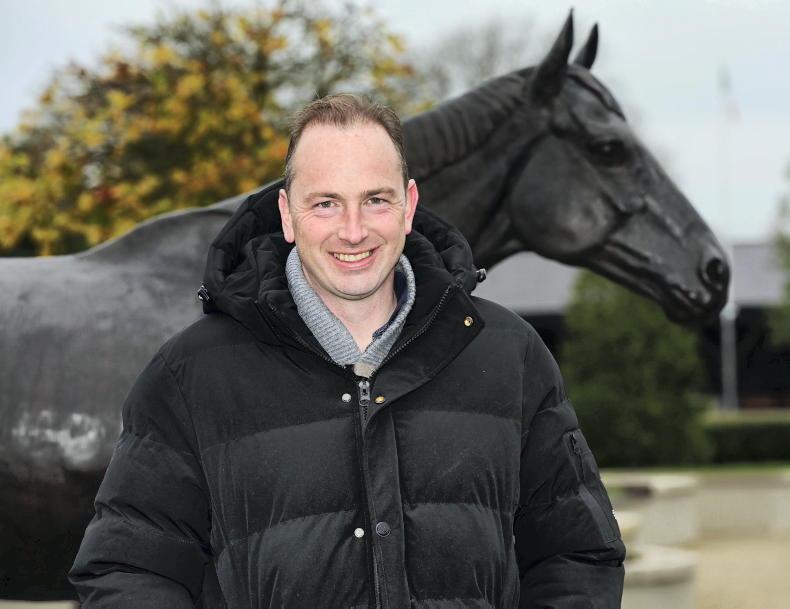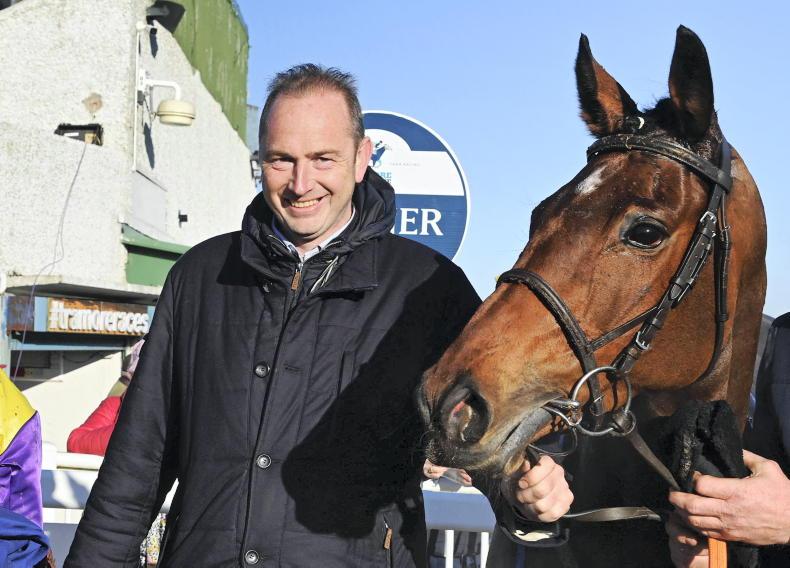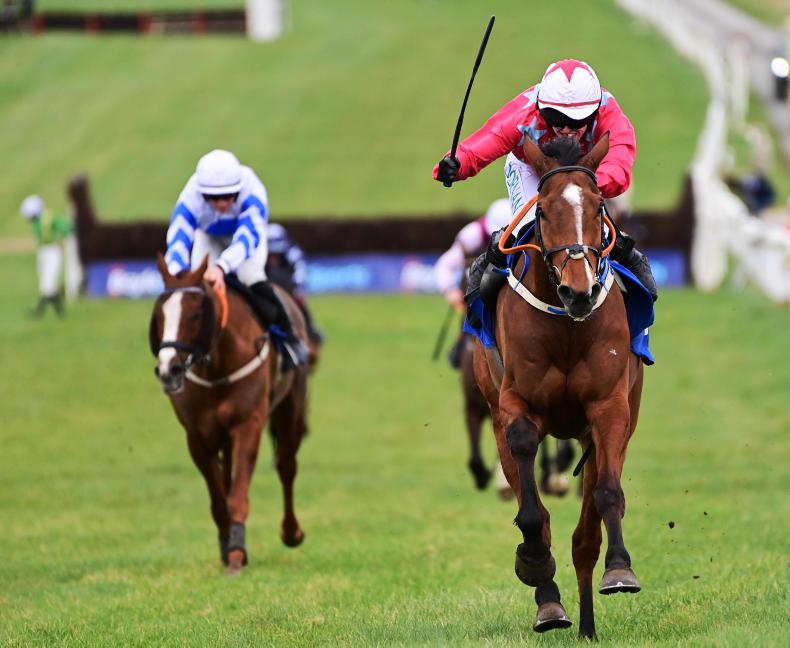WHEN Philip Rothwell has a horse running at Cheltenham, he watches on from just in front of the old stand, where you get a great view of the field coming up the hill. He says the hairs on the back of his neck stand up when he sees his horses running up that hill, whether they’re in contention or not. He loves Cheltenham. Always has.
The adoration was transcended when in 2006 he sent Native Jack out to win the Cross Country Chase at the age of just 28. The equivalent of a 16-year-old footballer scoring at the World Cup. Later that day he was introduced to J.P. McManus, who told him that if he ever saw a nice horse, to give him a call. He already had Gigginstown-owned horses in his yard. And he already had 100 winners to his name.
That was it. Cheltenham was a mainstay. The Festival was at his feet.
But it was only when 33/1 Mc Alpine scythed his way through a field of 18 runners to win a 0-125 novices’ handicap hurdle earlier this month that he’d test a second success at Prestbury Park.
To put the time between drinks into context, when Native Jack won, it was Davy Russell’s first Festival winner and it also came two days after the birth of Rothwell’s first child, who is approaching her Leaving Cert year now. It came at a time when Irish Cheltenham winners were relatively sparse and the power among yards at home was more even. It was before the crash, when the economy boomed and racing moved parallel with such fortunes.
Rothwell’s own fortunes boomed thereafter as well. He’d train another 100 winners in the following four seasons and went close to another Festival winner on several occasions. But the crash hit some of his owners hard, and unfortunately for him, there would be more setbacks to come.
His is a tale that so many Irish jumps trainers can relate to. In it for the love of it but working damn hard to do so.
“Fifteen years ago I won the Cross Country here and I didn’t think it would take me 15 years to get back here,” he told Lydia Hislop after Mc Alpine’s win caused his emotions to overflow live on Racing TV.
“I love it. I just love the place.”
***
Philip Rothwell has been a trainer every single day of his life he possibly could have been. Having completed the first ever trainer’s course at the age of 20, he couldn’t receive his licence until he was 21, so he had it ready and waiting for him on his birthday. He was the youngest trainer in Ireland at the time, yet he wasn’t exactly destined to take up this vocation.
The son of a farmer, Rothwell went to boarding school in The King’s Hospital in Dublin. He played just about every sport imaginable but was hooked on racing after he attended point-to-points with his father who had horses in training with Willie Mullins at the time.
“I begged my dad to bring me to the Irish Grand National one year,” he recalls. “I absolutely loved it. The crowds were huge. My dad hated it. He’d much rather be standing under a tree at a point-to-point, but I loved it.
“When I was 14, I did some work experience with Willie Mullins and I remember just loving it, but also becoming overawed by it and thinking I’ll never be able to do that. Leaving school I went to Ag college down in Kildalton and went working for Aidan O’Brien in the mornings on the Hill and I just loved every minute of it again. At that stage I couldn’t see myself wanting to do anything else.”
With the help of his parents, Rothwell set up a training base at home in Tinahely, Co Wicklow. He had his first winner with just his second runner and generally found success very quickly. By his third season he had 29 winners and was among the top 10 trainers in Ireland.
“It started to build crazy fast,” Rothwell recalls. “When I got my licence, I was training out of three converted chicken sheds and three converted cattle sheds in my dad’s yard. We put in a very good gallop but that’s all I had at the start.
“I was cheap and cheerful. I was 21 years of age, robbing my dad’s straw out of his hay shed. I was training horses for €70 a week at the time and I got a serious amount of press and media publicity. I got an awful lot of horses that were with different trainers and had just lost their way but a lot of them had previous winning form and were ready to go. We were lucky enough to get good results with them.
“At the time it probably passed me out a bit. It grew too fast and I was kind of too young to deal with it. Without sounding ungrateful, I probably had too much success too quickly. I made plenty of mistakes.
“But I had a very good, solid 15 years. We progressed from having typical summer horses to making a breakthrough during the winter. The results were very solid. I was fortunate that Gerard and Theresa Burke came along and they started buying a few stores that were a little bit more expensive than what I was used to buying and they gave me the reins to buy a few myself.
“I was very lucky with what I bought - the return from what we bought worked out really, really well. It propelled me to have a few good graded horses and then Michael O’Leary came along and I had a few nice horses for him. Rathlin was probably the best of them and I’m pretty sure I won with all of them bar one.”
Blow
As it happened, Rathlin was the last Gigginstown horse to leave Rothwell’s Tinahely base in 2012, when that operation transitioned to cull their trainer roster. That was a blow but it wasn’t a seismic hit. Rothwell had two solid seasons directly after that but a real struggle developed in the 2014/15 season when he sent out just one winner, having had 19 the previous season.
“I had an issue with feed in the yard, we had lost a few owners also and it was just the way the cards were dealt that we ended up with a poor bunch of horses,” he reflects. “Within the space of 18 months I’d gone from having 50 horses to 20 and if you put the whole lot of them together, you wouldn’t have created a winner.
“I had Saoirse Dun finish third in the Irish Grand National the season before. He had very little mileage and had loads of scope to improve but he wasn’t back in the yard three weeks that September and he dropped dead from a heart attack. I had an exceptionally good horse for Oliver Barden, a three-year-old, probably the best horse I’ve ever had. Three weeks after Saoirse Dun died, he broke a hind leg on the gallop.
“We weren’t going particularly well at the time but I really thought those two horses could fly the flag for us and it was sickening to take. There and then we had to start from scratch. I had, and still have, a very loyal owner base, people that have been with me for 15 years and they stuck by me. I think now you’re starting to see the results of that rebuild. We’re back up to good numbers again and we’ve had three solid seasons including this one so far.”
Other trainers have given up the game with better results than Rothwell had for a three-season period between 2014 and 2017 that saw just 11 wins in all. He is at pains to praise the team of owners for their patience and loyalty. If he could tell his 21-year-old self one thing, it would be to worry about getting the right people around you, and the horses will follow.
The fact that Mc Alpine is owned by the Barden family, who lost that very good three-year-old but remain as enthusiastic, contributed to his high emotions when the horse won at Cheltenham. But he has had to show his own metal as well, his love of training tested by the game’s cruelest side.
“I’ll never forget the day that good three-year-old died on the gallops,” he recalls. “I was standing on the edge of the gallop and he went about 10 yards past me. I was waiting for the vet to come and I’ll never forget it because I couldn’t feel any emotion.
“I couldn’t cry, I couldn’t shout, I couldn’t scream, I couldn’t do anything. I was in such a state of shock that I couldn’t feel anything. This was my two best horses gone in three weeks. I’ve never in my life felt anything like that and I never want to feel it again.
“Day to day I don’t think about things too much. I try not to dwell too much on stuff but when things are going against me, I think I’m good at coping. I’m mentally quite tough but I work hard at it and I think if you put so much into something and you achieve it, it’s got to mean a huge amount to you. It really means a huge amount to me. I take things quite personal with it and as people have seen, I can get a bit emotional.
“If you didn’t get a great kick out of the good days in racing, you couldn’t stay doing it. You’d want a huge amount of money behind you or something because it’s financially very, very hard work, especially now with the expenses going up, it’s a very tough industry to keep your head above water.
“I see the IHRB have increased our licence fees for next year and I thought it was a very strange time to do it. Insurance is obviously a big thing and it’s going up everywhere now. Feed prices and diesel prices are going up. It’s a hard industry to make a living at right now so you’d want to enjoy the good days.”
Rothwell’s emotions can extend to speaking up when he feels the need to and he’s never shirked that. He was highly critical of the state of the ground at Kilbeggan earlier this year, in a video that was watched 12,000 times on his Facebook page.
He says he had many senior jockeys, trainers and industry stakeholders come up and say fair play for saying it, and while such criticism may not endear him to the powers that be, that is the type of all-in character he is.
Ambition
That attitude extends to his core love of training racehorses. The point-to-point selling model doesn’t appeal to him. The ambition is to compete in one of the toughest racing jurisdictions on the planet despite the handicap of a miniscule budget.
“I remember listening to Willie Mullins years ago and he was saying he was offered quite a bit of money for Wither Or Which before Cheltenham and there and then he made up his mind that he wanted to become a horse trainer rather than a horse seller. I always felt the same. Obviously you have to sell sometimes but I feel that if a good horse did come along, there’s a good chance that I’d be able to sell it to hold on to it in the yard.
“I was never in a position whereby I had enough money to go and spend on expensive stores to go trading them. My average spend on a store horse is about €3,000 and when you take the average spend on a store horse is about €55,000 at the Derby Sale this year. But I never really had aspirations to go down the point-to-point route.
“My whole thing is keeping racehorses we can go and win races with. When you’re not spending a huge amount of money on horses, it’s hard to get to the next level but I’m content with where I am at the moment and the people I have around me.
“I’ve trained over 300 winners. I’ve a great amount of experience for 43 and I have a great foundation laid for the next 10 or 15 years I hope. I’ve a very good facility built up and I have an excellent team of staff behind me and that’s a huge help.
“This is a young person’s game or you need a huge amount of money behind you. It has to be one or the other because I couldn’t see myself doing this when I’m 70. I do as much as I can here to make training viable – I’m driving horses to the races myself most of the time. It’s a serious amount of hours a day, seven days a week.
“I’m lucky I’ve got a very supportive family. My wife Niamh and kids Cara, Cian and Colum.
It all stems from a pure love of the game, an unshakeable love it would seem. Rothwell is more than happy to plough on, content to shop “bargain basement” for horses but also addicted to the ambition of getting back to the Cheltenham Festival, however more difficult that goal has become in recent years.
“I’ve never really dreamed about becoming champion trainer but that doesn’t mean I’m not ambitious, I’m hugely ambitious. I would love to keep a number of 50 horses and give each of them my very best. I want to compete on the bigger days. If you have 50 horses, you’re not going to be soaring up the trainers’ championship but you can compete on the bigger days.
“I’ll die a happy man if I can train a graded winner at the Cheltenham Festival. Mc Alpine winning the other week at Cheltenham meant a huge amount to me but I want to be back in Cheltenham in March.
“We just don’t have anything at the moment but I certainly hope I can make it happen again.”


 This is a subscriber-only article
This is a subscriber-only article
 It looks like you're browsing in private mode
It looks like you're browsing in private mode












SHARING OPTIONS: